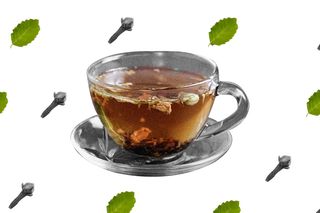
Untrending: Kadha Tea Has No Proven Immunity‑Boosting Powers
While kadha tea is hailed as the ultimate home remedy in Indian families, there’s no scientific evidence proving its health benefits.

In Untrending, we side-eye the latest fads so we know what we’re getting ourselves into — and what (if anything) we’re getting out of them.
All Indian children have had the misfortune of being forced to chug kadha — a decoction of herbs and spices that tasted bad enough to seem incredibly healthy. Or at least, that’s what our mothers and grandmothers told us. And now — in 2020 — the Indian AYUSH Ministry (Ayurveda, Yoga & Naturopathy, Unani, Siddha, and Homoeopathy) has followed suit, claiming that kadha is an immunity-booster that prevents Covid19.
It’s not. There’s no scientific evidence that proves kadha’s ingredients can boost immunity and prevent illness — let alone prevent Covid19 specifically.
Made of basil, ginger, cinnamon, black pepper, and occasionally turmeric, kadha‘s origins lie in ancient Ayurveda, an Indian alternative medicine system. The beverage’s many benefits allegedly include getting rid of cold, flu, and cough, easing menstrual flushes, boosting immunity, anti-aging and improving skin. As of now, no scientific research has examined the efficacy of kadha’s exact formulation. One 2020 pre-print of a study does find kadha is capable of boosting the immune system and preventing hypertension and diabetes. However, this study can’t be taken conclusively because first, it’s only one study and second, fellow scientists did not peer review it to check for errors.
With respect to herbal teas in general: A paper published in the Journal of Traditional and Complementary Medicine states that herbal teas contain natural bioactive compounds. “A wealth of available scientific evidence demonstrates that natural bioactive compounds render a number of diversified biological effects, such as antioxidant, antibacterial, antiviral, antiinflammatory, antiallergic, antithrombotic and vasodilatory actions, as well as antimutagenicity, anticarcinogenicity and antiaging effects,” it states. However, this scientific evidence is mostly observational. A review of more than 21 studies published in Plant Foods for Human Nutrition concludes there’s simply not enough quality research to draw conclusions about the safety and clinical efficacy of herbal teas.
Related on The Swaddle:
There’s No Such Thing as a Superfood
The individual ingredients in kadha are often called ‘superfoods’ due to their high nutrition content, even though this nomenclature has long been debunked. The ingredients in kadha — basil, ginger, black pepper, cinnamon, and turmeric — all supposedly have immunity-boosting, antioxidant, and anti-inflammatory capabilities. But studies into these properties are either small or do not involve human beings. For instance, a double-blind, randomized, controlled trial reported increased immunity in people after they took 300mg of basil leaf extract daily for a month. But, that study involved only 24 people.
Another study of cinnamon’s efficacy in improving blood glucose levels involved 60 people only. A comprehensive analysis of black pepper concludes the spice has health benefits — but only in tests on animals. Only ginger and turmeric have several trials involving humans, but these, too, fall prey to small populations and unstandardized practices, according to scientists who have comprehensively studied both ingredients. This makes it difficult to conclusively say that these ingredients will always deliver benefits when consumed.
While these ingredients are safe and harmless to consume, several doctors have cautioned against drinking kadha too often — especially during the immunity-boosting frenzy in the initial months of the Covid19 pandemic. Drinking kadha more than once daily could lead to side effects like, “excessive bleeding, digestive issues, acidity, problems in urinating, boils in the mouth, bleeding from the nose,” according to dietician Meher Bakshi in an interview with the Indian Express.
“It is unfortunate to see people putting themselves at the other health risks in the name of consuming immunity boosters. Overconsumption of products such as ashwagandha, kadha (concoctions), and chyawanprash among others is leading to digestion problems and other health issues,” Dr. Gaurav Jain, an internal medicine consultant, told The Print.
“Rather than an increase in the number of patients with heartburn, I have noticed worsening of symptoms in some of my patients with gastro-esophageal reflux who consume kadha in large amounts,” Dr. Avnish Seth, director of gastroenterology and hepatobiliary sciences at Fortis Memorial Research Institute, Gurugram, told the Indian Express.
As of now, kadha is merely a herbal beverage and nothing more. But, though kadha may not have ideal scientific proof on its side, its ingredients exhibit some potential that can be harnessed via the right clinical trial and testing procedures. Till then, it shouldn’t be too hard to consume it in moderation, considering how awful it tastes.
Aditi Murti is a culture writer at The Swaddle. Previously, she worked as a freelance journalist focused on gender and cities. Find her on social media @aditimurti.
Related


What Does It Mean to Be Color Blind?
